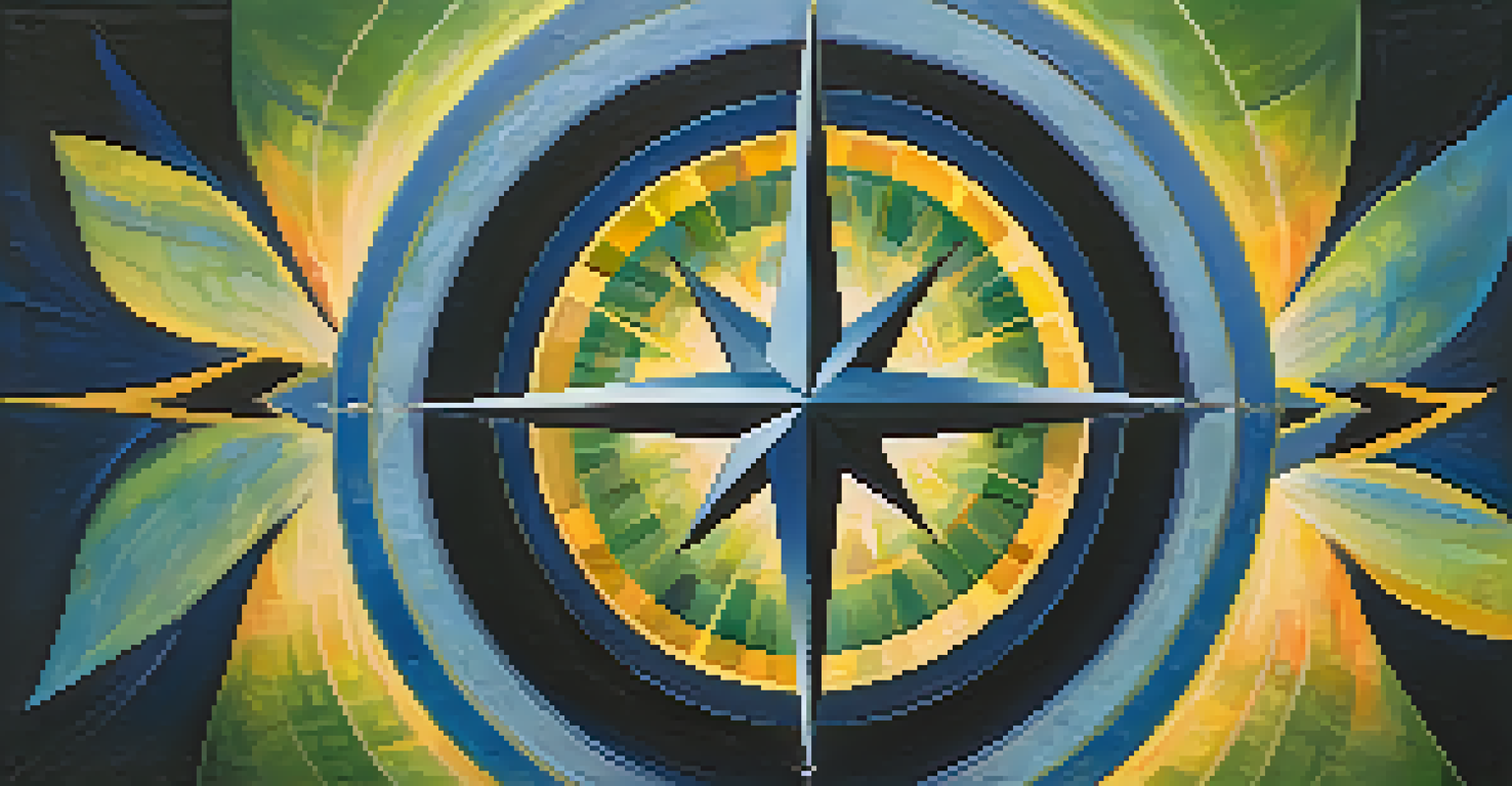Intuition: The Silent Guide in Spiritual Decision-Making

Understanding Intuition in Our Lives
Intuition often feels like a whisper from within, guiding us when logic falls short. It’s that gut feeling we sometimes ignore, yet it can lead us to profound insights and decisions. Think of intuition as your inner compass, always pointing you toward your true north, especially in uncertain times.
Your intuition knows what to write, so get out of the way.
Many people describe intuition as a sense of knowing without knowing how they know. It taps into our subconscious, drawing from past experiences and emotions. This ability can be particularly powerful in spiritual contexts, where the answers might not be black and white.
By paying attention to our intuition, we open ourselves to deeper understanding and awareness. It invites us to trust ourselves and the journey we are on, making space for growth and connection with our spiritual selves.
The Role of Intuition in Spiritual Decision-Making
In spiritual decision-making, intuition serves as a guiding star, helping us navigate choices aligned with our values. When faced with dilemmas, tapping into our intuitive sense can often reveal the path that resonates most deeply with our spirit. This process is about listening to that inner voice, which may often be drowned out by external noise.

For instance, consider a time when you felt torn between two paths—say, a career change or a personal relationship. Your rational mind may have laid out the pros and cons, but it was likely your intuition that provided the clarity on which choice truly felt right for you. This illustrates how intuition can bridge the gap between our intellect and our soul.
Intuition as Inner Guidance
Intuition acts as a personal compass, guiding us toward decisions that resonate with our true selves, especially when logic falls short.
Relying on intuition doesn’t mean abandoning logic; rather, it’s about finding a balance. When spiritual decisions combine analytical thinking with intuitive insights, we can embark on a journey that feels both purposeful and fulfilling.
Cultivating Intuitive Awareness
Cultivating intuitive awareness is a practice that anyone can develop over time. It begins with creating space for stillness in our busy lives, allowing us to listen to our inner guidance. Meditation, journaling, or simply spending time in nature can help foster this connection.
Intuition is seeing with the soul.
As you engage in these practices, pay attention to the subtle feelings and thoughts that arise. These can be seen as messages from your intuition, guiding you toward insights or decisions. Just like tuning a radio, the clearer your mind, the more you can hear those quiet signals.
Additionally, keeping a journal of your intuitive experiences can be beneficial. Reflecting on moments when you followed your gut can reinforce your trust in this silent guide, making it easier to rely on in the future.
Recognizing Intuitive Signals
Recognizing intuitive signals requires a bit of practice and patience. These signals can manifest as physical sensations, emotions, or even vivid dreams. For instance, you might feel a tightness in your chest when contemplating a decision that isn’t right for you or a sense of lightness when you’re on the right path.
Sometimes, intuition might come through in unexpected ways, like a song that resonates with your feelings or a conversation that sparks clarity. These occurrences are reminders to stay alert and open to the messages around you. Just as we learn to read the weather, we can learn to read our intuitive signals.
Cultivating Intuitive Awareness
Practices like meditation and journaling can enhance our ability to listen to and trust our intuitive insights.
Trusting these signals is crucial; dismissing them can lead us off course. By acknowledging and acting on our intuitive feelings, we nurture a stronger connection to our spiritual selves.
Overcoming Doubt in Intuitive Guidance
Doubt is a common barrier many face when trying to trust their intuition. It’s easy to second-guess ourselves, especially when logic and societal expectations come into play. However, it’s important to remember that intuition often defies conventional reasoning and may not always make sense at first.
Think of it like a seed planted in the soil; it may take time to see the results, but the growth is happening beneath the surface. To combat doubt, practice affirmations or surround yourself with supportive communities that value intuitive insights. This support can reinforce your belief in your inner guidance.
It’s also helpful to recall past instances when following your intuition led to positive outcomes. By reflecting on these experiences, you can gradually build a reservoir of trust in your intuitive abilities.
Intuition and Spiritual Practices
Many spiritual practices naturally enhance our intuitive abilities. Activities like yoga, meditation, and mindfulness encourage us to connect with our inner selves, creating a fertile ground for intuition to flourish. These practices help quiet the mind, allowing us to tune into that inner voice more clearly.
For example, during meditation, you might receive insights or clarity on a situation that has been troubling you. This moment of connection can reveal truths that spark a deeper understanding of your life's direction. It’s like cleaning the lens of a camera—suddenly, everything comes into focus.
Overcoming Doubt in Intuition
Building trust in our intuition involves recognizing past successes and surrounding ourselves with supportive communities.
Incorporating rituals or mindfulness into your daily routine can further strengthen this connection. Whether it’s lighting a candle, practicing gratitude, or simply taking a moment to breathe, these acts can help ground you and open the channels of intuitive guidance.
Embracing Intuition for Growth and Transformation
Embracing intuition is a powerful step toward personal growth and transformation. When we allow ourselves to trust our inner guidance, we enable ourselves to make choices that align with our true selves. This alignment often leads to a more fulfilling and authentic life experience.
Consider a time when you made a decision based on intuition—how did it feel? Often, these moments ignite a sense of empowerment and confidence, reinforcing our belief in our abilities. This transformative power of intuition can lead to new opportunities and paths we may not have considered otherwise.

As we continue to cultivate and embrace our intuitive nature, we find ourselves on a journey of self-discovery and enlightenment. It’s about trusting that quiet voice and allowing it to guide us through life’s challenges and triumphs.